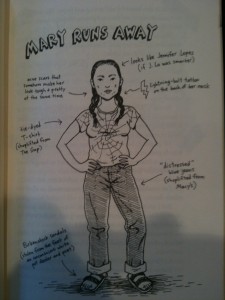Sara: Chapter 1: Question:
“Why do you think the Junior opens the story with a list of all the physical things that are wrong with him?”
It’s possible that the author is trying to get the reader to sympathize with Junior. We found that the although the litany of complaints did go on a little long, we found that it was lighthearted and funny at the same time.
Chapter 2: The author states that “They never got the chance to be anything because nobody paid attention to their dreams.” Do you think there is foreshadowing in this chapter? Why does the narrator describe living in poverty and what the effects of poverty are on his parents?
We understand from this chapter that we are going to be talking about dreams. The effects of poverty on this family is systemic, lifelong, and generational, and devastating. I have read the novel, so it’s actually enjoyable to see that there is a fair bit of foreshadowing happening in the text; however, the
Chapter 3: What do you think attracts Rowdy and the narrator to each other, considering they are so different? How are they character foils for each other? The chapter ends with “Rowdy and I are inseparable.” Do you think this is setting us up for something?
Rowdy has so much anger and feels so helpless. His relationship with Junior gives him something to protect
Chapter 4: How do the pictures add to the story? What does the picture of Mary tell you that you wouldn’t know from reading the traditional text? Why isn’t this information part of the story?
Corrina: Questions for Chapters 12-18
What is the significance of Junior beginning his experience at Reardan as a “Zombie?”
Throughout the book the Aboriginal community is referred to as kind of zombies – their humanity has been stripped away and they are almost catatonic yet prone to rage – much like zombies. In the future, many accidents and tragedies will ensue as a result of zombie like behaviour. It also signifies his status in the community which he describes as “zero” – meaning he is less than a human, or a non-human due to his Aboriginal status and his status as an impoverished outsider.
What could the petrified wood symbolize?
I found the example of Junior’s explaining the true nature of petrified wood to his science teacher very powerful. It could be seen as representing the history of the Aboriginal people, a history of trauma, a people that have held their shape over time yet the essence of what once was is gone and has been replaced by something else. It could also be seen as a process of healing, a slow remedy for what is dying or dead, and the preserving of the past through transfusion. It also could represent something frozen or locked in time.
What is the significance of Junior’s sister marrying the blackjack dealer. In one of the funniest moments of the book:
“She said he wasn’t afraid to gamble everything, and that’s the kind of man she wanted to spend her life with.”
I couldn’t believe it. My sister married a guy for a damn silly reason. But I suppose people often get married for damn silly reasons.
Both Junior’s sister and Junior take large risks – they gamble with their fates. What role does fate and gambling with ones fate have in this novel?
What is the significance of Gordy’s statement: “The world, even the smallest parts of it, is filled with things you don’t know.” How does this relate to the rest of the novel?
I think that Junior faces a very steep learning curve and he has to be humble enough to realize that everywhere he goes he is learning and there are things that he doesn’t know. It is his humility in this regard that makes him such a likeable character.
Nabíl: After reading tsex chapters that included the second basketball game between Reardan and Wellpinit, the question that came to my mind was “how can you love and hate someone at the same time?” Arthur claims that Rowdy is still his best friend even though they hate each other. A high schooler reading this novel might wonder how this could be.
Gloria: Chapter 20-26
1. Has your opinion about anthropologists changed after reading the chapter, “Wake”? If so, how? If not, why? How do you evaluate the validity of their discoveries? (“Wake”)
The chapter, “Wake,” reminded me of the time when I took an anthropology course. One day, the professor showed us a cartoon of a group of indigenous people making fun of anthropologists’ ignorance and naivety. The story of the cartoon is that the native people were watching TV, eating chips, and wearing modern clothes, but when they see that anthropologists are coming they get rid of the TV and chips and change their clothes so that the anthropologists still think that they still follow traditional customs. Since then, I began to question whether I could rely on the information anthropologists bring from various cultures that are not familiar to us. Also, after reading this part of the novel, I began to suspect if we would ever be able to say that we know Native Americans very well. This chapter suggests that even experts may have wrong ideas thus it is crucial that we become humble and critically examine our beliefs about people and cultures we have never met or experienced.
2. How do you understand the following statement: “When it comes to death, we know that laughter and tears are pretty much the same thing” (166)?
This statement sounds like a paradox, so it was hard to understand it. When I first read it, I just thought that it means that when someone close to one dies he/she feels so sad that he/she might become insane and lose the ability to discern which emotion one should feel. Thankfully, during the group discussion, my group members have provided more insightful thoughts on this statement. We have come to an agreement on the idea that Junior is laughing at the absurdity of his grandmother’s death. His grandmother never drank alcohol and has been such a nice person not only to her family but also to others. (We know that she is generous because she begs her family to forgive the drunken driver who has killed her.) To Junior, his grandmother is a person who deserves the biggest reward for being kind to everybody; therefore, to Junior, the fact that she has been killed by a drunken person must have looked ridiculous, like a joke.
3. Discuss how Junior is a “secret weapon” in his basketball team.
Junior is a secret weapon because he looks abnormal on the outside, with lopsided eyes, huge glasses, big head, skinny body, and stuttering and lisping. To summarize, he looks like a weak pushover. However, he proves to be a lot stronger than what he appears to be. Those who judge people by appearance will surely be terrified when they see Junior’s play. On top of his good shooting skill, Junior demonstrates perseverance and courage. He fights against Roger and Rowdy, both who have better physical conditions for basketball than himself, and succeeds in scoring goals. This passage reinforces the importance of evaluating one’s worth based on their skills and character rather than his/her appearance.
4. Junior informs the reader how well Eugene played basketball. He says, “Euegene was a legend. People say he could have played in college, but people also say Eugene couldn’t read” (145). In your opinion, how important is literacy to people like Eugene?
After reading this part, I pondered on the relationship between sports and literacy. At first, I thought that sports players do not need to worry about their literacy because their performance is based on skills. However, I quickly changed my mind because in Eugene’s case it is not about improving his literacy or being educated; his problem is that he cannot read at all. We don’t know whether Eugene has given up on studying early in his life or was not given a chance to obtain basic literacy skills. Whichever the case might be, I believe that it is important to obtain fundamental literacy skills to survive in today’s society because literacy is a crucial pre-requisite for getting a job. Also, it is important that one can read for the sake of his/her safety. This passage once again reminds us of the importance of acquiring the ability to read.

